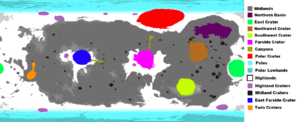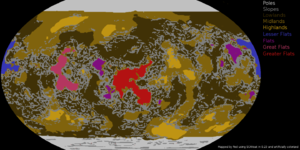Biome
In Kerbal Space Program a biome is a geographic area on the surface of a celestial body typically corresponding with types of geology like mountains or craters. This is in contrast to the real meaning of the term in which biomes are biotic communities in contiguous areas with similar climatic conditions and organism populations.
The results of science activities often differ when performed in different biomes, and thus provide more opportunities to earn Science Points in Career Mode to research further along the technology tree. In Sandbox, even the text descriptions from experiments are unavailable, rendering biomes unimportant.
Areas belonging to a biome may be geographically separate, but they're not considered different areas. For example, after performing an EVA Report at Kerbin's north polar IceCap biome, performing one from the southern IceCap gives the same results (and Science Points) as if it had been performed a second time in the northern IceCap.
Currently[outdated], only Kerbin and its moons – Mün and Minmus – are fully mapped with biomes. Jool's moon Laythe and the planet Eve have bodies of water and science activities performed in them are stated as being from "Laythe's oceans" and "Eve's oceans". However, this is just the effect of the situation "SrfSplashed" for a splashdown versus the usual "SrfLanded" surface landing.
Kerbin
The planet Kerbin has 9 biomes, plus 3 surface-only “location biomes” comprising Kerbal Space Center. Roughly 60% Kerbin's surface is Water biome. Grasslands and Highlands biomes cover most of the land area.
Among the celestial bodies with biomes, Kerbin is currently[outdated] the only one that also has bodies of water. Oceans, seas, and larger lakes belong to the Water biome; but most rivers and smaller bodies of water are the same biome as the ground around them. This way, it is possible to do science activities in the SrfSplashed situation for every biome. Meanwhile, small islands in Water biome areas, such as at the Old Airfield, sometimes are counted as SrfLanded, not splashdowns, within the Water biome. Shores, naturally, have both land and water.
Kerbin is the only celestial body with location biomes: the grounds of KSC and within it the LaunchPad and Runway. Each count as a biome only with experiments performed on the surface. KSC is within a Shores biome, so experiments while flying at any altitude over the LaunchPad, Runway, or KSC count as Shores. However, it is possible to get an “EVA Report while flying over” these three. The exact trigger is unknown but may relate to split-second timing while jumping on a parked vessel.
Kerbin biome list
- Grasslands
- Highlands
- Mountains
- Deserts
- Badlands
- Tundra
- IceCaps
- Water
- Shores
- KSC
- LaunchPad
- Runway
- KSC
Mun
The Mun has in total 15 biomes, 7 of which are uniquely named major craters. Most of the surface area belongs to the Midlands biome followed by the Highlands. Canyon biomes extend off a few major craters.
Mun biome list
- Northern Basin
- Highland Craters
- Highlands
- Midland Craters
- Midlands
- Canyons
- East Crater
- East Farside Crater
- Farside Crater
- Northwest Crater
- Southwest Crater
- Twin Craters
- Polar Crater
- Polar Lowlands
- Poles
Minmus
Minmus has in total 9 biomes. The most distinctive quality of Minmus's biomes is the variety of Flats, which in-game text describe as “lake beds”. They are almost perfectly flat and may represent salt flats. Roughly two-thirds of the surface area is irregular terrain transitioning between Highlands, Midlands, and Lowlands with Slopes in-between.
Minmus biome list
- Highland
- Midlands
- Lowlands
- Slopes
- Lesser Flats
- Flats
- Great Flats
- Greater Flats
- Poles


